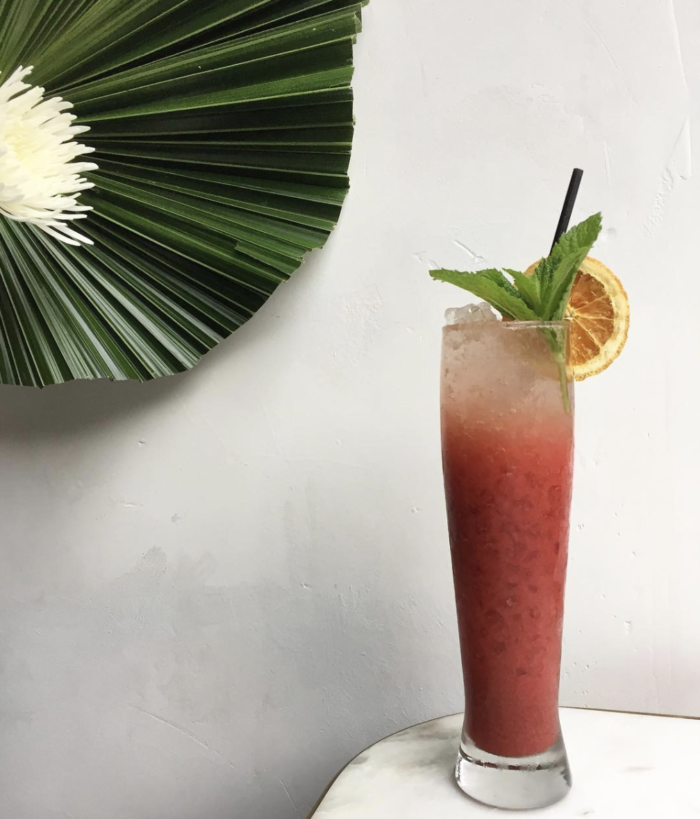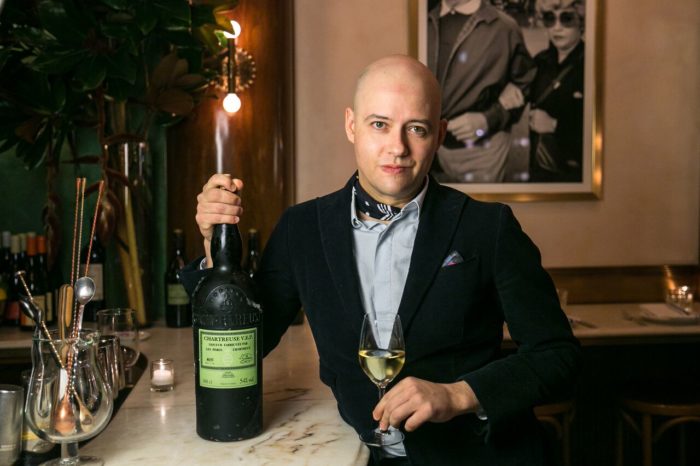One bar stirs up cocktails with pan-Latin flair. Another hints at its recent past as an infamous bordello. Still another, with a feminine touch, is named after a 20th-century fashion icon. For all their variety, these new Brooklyn craft-cocktail bars have one thing in common: style.
Exhibit A may be the Frozen Painkiller, a popular recent choice at Elsa, which opened in July on Atlantic Avenue in Cobble Hill. “A Painkiller is a classic drink but I kind of put my own spin on it just for the purposes of serving it as a frozen cocktail,” says Scott Schneider, a co-owner of the bar. “All of our drinks are super pretty and have floral and colorful garnishes, but the Frozen Painkiller is served out of an old, brown medicine bottle with a metal straw so it’s very different from our other drinks.”
While Brooklyn has become a hotbed of the craft-brewery taproom craze in recent years, now cocktails are having their hour. “Brooklyn took its sweet time developing its own scene … which has recently come to fruition with a smattering of characteristically weird, wonderful and eccentric bars,” enthused the online magazine Punch. To be serious about the business of craft cocktails, you need a mixologist. We visited a few of these new stars to hear what’s behind all the shaking and stirring.
Leyenda: Way Beyond the Margarita
Once you step inside Leyenda, a “Brooklyn Coctelería” in Boerum Hill, your eyes are immediately drawn to the backbar, where bottles are stored in colorful cabinets. Behind the bar is Ivy Mix, a mixologist and co-owner of Leyenda, who was voted American Bartender of the Year at Tales of the Cocktail in 2015. Mix grew up in the U.S. but her inspiration for bartending came from time spent living in Guatemala. “When I was there, I was 19 and this was pre-Facebook, and the only place I knew to find people was a bar,” she said. “After some time, I made the realization that I could get paid to work at the place that I was spending so much money at. It was great.”
When she moved to New York in the midst of the Great Recession, she couldn’t find work in the world of art, which had been her major at Bennington College, so she funneled her creative energy into cocktails as that scene took off. At Leyenda, her Latin-inspired potions include the La Sonambula, composed of jalapeño-infused blanco tequila, lemon, chamomile, mole and Peychaud’s bitters.
Customers seem ready to sip outside of their comfort zone. “Here, we’re already dealing with things that aren’t that normal,” says Mix, “so people who come in here are a little bit more open-minded than some of the other places I’ve worked. We have one couple that comes in and are constantly trying new things. They’ve tried every Mezcal.” Mix is not only a local celebrity, but a leader in her industry as the co-founder of Speed Rack, a national speed-bartending competition that helps shine a light on female mixologists and raises funds for charity.
Leyenda offers a range of Latin American cuisine as well: Peruvian ceviche, Argentinian skirt steak, papusas, empanadas, tacos and arepas. Starting Dec. 1, the bar will take on a new twist for a month as a pop-up tribute to Beyonce, calling itself “Sleyenda.” Menus will be printed on Beyonce Christmas cards, disco balls will appear, and a collection of sparkly reindeer will frolic.
Elsa: All About the Beverages
Elsa is the reincarnation of a beloved East Village bar, named after Roaring Twenties-era fashion designer Elsa Schiaparelli, that closed in 2014. The new version is visually striking yet comfortable, its elegant decor suggestive of the Prohibition Era. Even its bathroom, a mirrored cocoon, is Instagram-famous. The owners–Natalka Burian, her husband Jay Schneider and her brother in law Scott–started in the bar business with a different concept. “The original Elsa opened in about 2007 and at that time it was a bar called The Hanger that my brother’s wife and some of her friends owned for a few years,” says Scott Schneider.

A drink called Painting the Daybreaks at Elsa in Cobble Hill (Photo courtesy of Elsa, via Instagram)
After Burian and Jay Schneider got married, they decided to give the place a more upscale persona, “less masculine and more feminine in terms of the design,” says Scott. At the time, he had no experience in the hospitality business. “I just kind of immersed myself in it,” he says. Three years later, the trio opened Ramona, a craft-cocktail bar in Greenpoint.
At Elsa, which serves snacks but no entrees, the focus is on the menu of 20-plus cleverly concocted (and named) drinks. “Our whole thing is that we’re using our kitchen to come up with all of the ingredients for our drinks and to have a much bigger cocktail list,” says Scott. I feel like it kind of just gives the vibe that it’s a little more fun. We don’t want people to feel like there’s a waitlist or that it’s super exclusive. We want people to mingle.”
The cocktails are irreverent rather than pretentious. Among them: Death of a Ladies’ Man, made with rye, maple, Laphroaig 10-year-old Scoth, lemon and tobacco bitters.
“If you look at any of the drinks, they’re all infusions, but I try to avoid using those stereotypical mixologist terms,” said Scott. “Everything we do, if there’s any sort of flavored spirit or special syrup, it’s all made in house. At least one ingredient has to be something that’s house-made, so that no one else can really have it. We can make any classic cocktail, but when it comes to our house cocktails, we kind of like to be really out there.”
Barely Disfigured: A Dash of Notoriety
On the site of an alleged brothel that caused a stir in the neighborhood when word got out last year, a lounge of the legal kind opened this week. Barely Disfigured, named after a 1930s French poem by Paul Eluart, has a playfully suggestive 1930s Parisian style. The bar “is imbued with references to both the poet and the previous business. The bar’s decor is a throwback to Eluart’s time. From the photos on the wall, to the vintage items on display, to the crystal carafes behind the large serpentine counter, all is of the surrealist period,” writes Katia Kelly in her celebrated local blog Pardon Me for Asking.

Owners of the newly opened Barely Disfigured craft bar: Jeremy Andre, Damien Frey and Regis Vankaster (Photo by Katia Kelly of Pardon Me for Asking)
Last December, around the time the house of ill repute shut down on Smith Street in Boerum Hill, restaurateurs Jeremy Andre, Damien Frey and Regis Vankaster were looking for a venue for a new bar to follow up on the success of their Alsatian-themed restaurant La Cigogne in Carroll Gardens. After taking over the Smith Street space, the restaurateurs decided to pay homage to the previous tenants, but not in cavalier way. “We didn’t want to make fun of prostitution or for it to be taken out of context,” said Andre. The theme of the poem, he notes, is “about how women used to be portrayed, as an object of art.”
The drinks have a history too. The Winchester Goose, a bourbon-based drink, takes its name from a term used for prostitutes in medieval London. The One-Two-Two is named after an old Parisian brothel. The owners plan to donate a portion of their proceeds to the Sex Workers Project, which provides legal and social services to people who engage in sex work, whether by choice or coercion.
Maison Premiere and Sauvage: North Side Siblings
Maison Premiere, which won a coveted James Beard award last year for “best bar program,” is practically the grandaddy of Brooklyn’s new wave of cocktail bars, opening in 2011. Maison Premiere specializes in classic drinks, along with an outstanding oyster selection and seafood dishes. Last year the same owners opened the Greenpoint restaurant Sauvage, which is more of an avante garde bistro.

Will Elliott, bar director at Maison Premiere and Sauvage (Photo by Brina Balducci, courtesy of Maison Premiere)
“We equipped the bar at Maison for the classics. Anyone can come in and can get anything,” says Will Elliott, the bar director for both establishments. “I feel like I really have to honor tradition and an expectation of making famous drinks, famously. Making them better and larger than life.” At Sauvage, in contrast, “the making and curating is really based on stories. It’s about smashing the mold of what cocktails are all about,” he said. The choice of particular liquors “changes the way the cocktails taste. The rum selection is specific. So a mojito will taste differently and will highlight the producer.” Sloe Moon’s Rose, for example, is a mix of “Reisetbauer Sloe, Framboise, Lime, Edinburgh Gin, Bitter.”
As a mixologist, Elliott is self-taught, starting 15 years ago with a bicoastal pair of gigs: one at a seasonal restaurant on an island off the coast of Maine, the other at a divey but celebrated music venue in Tucson. In the Arizona venue, “I started to bring in crazy beers, and it was the first couple years of mezcal in the U.S., so I was bringing those in as well. We made cocktails there and we tried to make them well. My motivation was tasting exotic things that taste like they come from somewhere specific.”
He still yearns to experiment, next time with East Asian liquors. “Japanese bartending culture is all about those sort of transportive and serene experiences,” he added. Asian drinks don’t really fit the theme of his current establishments, but they’re on his ice-bucket list. “I would love to be in a scenario to work with Soju and Baijiu and Japanese whiskeys.”